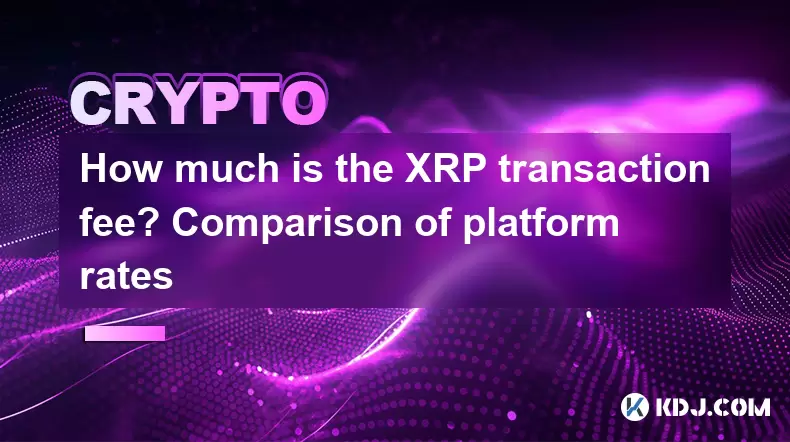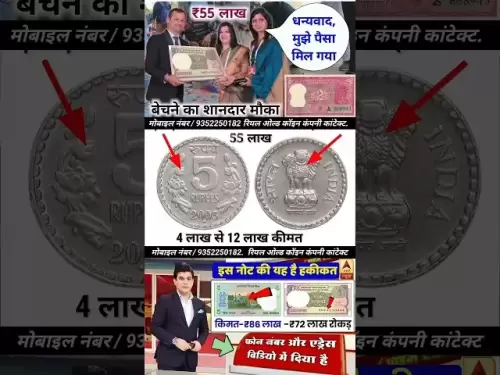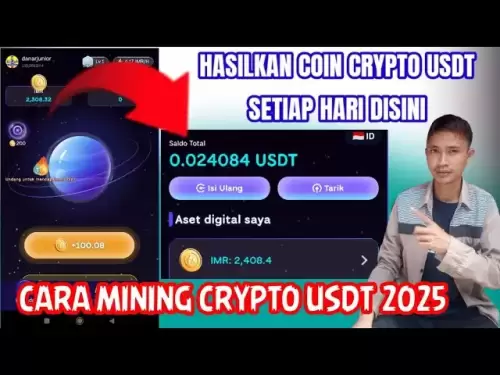-
 Bitcoin
Bitcoin $105,678.5433
3.97% -
 Ethereum
Ethereum $2,438.0085
7.47% -
 Tether USDt
Tether USDt $1.0005
0.00% -
 XRP
XRP $2.1913
8.48% -
 BNB
BNB $640.8349
3.02% -
 Solana
Solana $144.5565
7.67% -
 USDC
USDC $1.0000
0.00% -
 TRON
TRON $0.2728
0.43% -
 Dogecoin
Dogecoin $0.1638
6.23% -
 Cardano
Cardano $0.5855
6.90% -
 Hyperliquid
Hyperliquid $38.1165
9.12% -
 Sui
Sui $2.7823
11.35% -
 Bitcoin Cash
Bitcoin Cash $453.8805
2.07% -
 Chainlink
Chainlink $13.3114
12.02% -
 UNUS SED LEO
UNUS SED LEO $9.1448
0.95% -
 Stellar
Stellar $0.2484
7.25% -
 Avalanche
Avalanche $18.1889
7.53% -
 Toncoin
Toncoin $2.9059
3.39% -
 Shiba Inu
Shiba Inu $0.0...01164
5.99% -
 Hedera
Hedera $0.1520
9.43% -
 Litecoin
Litecoin $84.3123
3.09% -
 Monero
Monero $312.6435
3.72% -
 Ethena USDe
Ethena USDe $1.0006
0.01% -
 Polkadot
Polkadot $3.4586
6.41% -
 Dai
Dai $0.9999
-0.03% -
 Bitget Token
Bitget Token $4.2689
5.09% -
 Uniswap
Uniswap $6.9291
11.61% -
 Pepe
Pepe $0.0...09961
9.42% -
 Pi
Pi $0.5373
6.24% -
 Aave
Aave $261.4523
12.42%
How much is the XRP transaction fee? Comparison of platform rates
The XRP transaction fee is set at 0.00001 XRP, making it highly cost-effective compared to Bitcoin's $1-$30 and Ethereum's $0.50-$50 fees during peak times.
May 10, 2025 at 12:49 pm

The XRP transaction fee is a critical aspect for users and investors interested in utilizing the Ripple network. The fee structure is designed to be minimal to encourage frequent transactions while maintaining network efficiency. In this article, we will explore the current XRP transaction fee, compare it with fees on other major platforms, and discuss the factors influencing these fees.
Understanding the XRP Transaction Fee
The XRP Ledger uses a fee mechanism to prevent spam and denial-of-service attacks. The fee is measured in drops, where 1 XRP equals 1,000,000 drops. The minimum transaction fee on the XRP Ledger is set at 10 drops, which translates to 0.00001 XRP. This fee is exceptionally low, making XRP transactions highly cost-effective compared to other cryptocurrencies.
Factors Influencing XRP Transaction Fees
Several factors can influence the XRP transaction fee. The base fee is the minimum fee required for a transaction to be processed. However, during times of high network congestion, the load factor can increase, causing the fee to rise temporarily. The load factor is a multiplier applied to the base fee to ensure that transactions are processed in a timely manner. Users can also opt to pay a higher fee to prioritize their transactions during peak times.
Comparison with Other Platforms: Bitcoin
When comparing the XRP transaction fee to other platforms, Bitcoin stands out due to its high fees during peak times. The average Bitcoin transaction fee can range from $1 to $30 or more, depending on network congestion. This stark contrast highlights the efficiency and cost-effectiveness of the XRP Ledger. For instance, if a user wants to send $100 worth of Bitcoin, they might have to pay a fee of up to 30%, whereas the same transaction in XRP would cost a negligible fraction of a cent.
Comparison with Other Platforms: Ethereum
Ethereum also experiences high transaction fees, especially during periods of high demand. The average Ethereum transaction fee can fluctuate between $0.50 and $50, depending on gas prices and network congestion. Similar to Bitcoin, these fees can significantly impact the cost-effectiveness of using Ethereum for frequent transactions. In contrast, the XRP Ledger's fixed and low fee structure provides a more predictable and affordable option for users.
Comparison with Other Platforms: Stellar
Stellar, another blockchain platform, offers competitive transaction fees. The minimum fee on the Stellar network is 0.00001 XLM, which is equivalent to the XRP fee in terms of the base currency. However, Stellar's fee structure can also be affected by network congestion, although it tends to be more stable than Ethereum or Bitcoin. The similarity in fee structures between XRP and Stellar makes them both attractive options for users seeking low-cost transactions.
How to Check and Pay XRP Transaction Fees
To check and pay XRP transaction fees, users need to follow a few simple steps:
- Choose a Wallet: Select a reliable XRP wallet that supports transactions on the XRP Ledger. Popular options include the official Ripple wallet, Toast Wallet, and Ledger Live.
- Initiate a Transaction: Enter the recipient's XRP address and the amount you wish to send.
- Review the Fee: Before confirming the transaction, the wallet will display the current fee in drops and XRP. Ensure you are comfortable with the fee amount.
- Confirm and Send: Once you confirm the transaction, the wallet will deduct the fee from your account balance and process the transaction on the XRP Ledger.
Impact of XRP Transaction Fees on Users
The low transaction fees of the XRP Ledger have a significant impact on users, particularly those who engage in frequent or microtransactions. For businesses and individuals looking to transfer funds internationally, the low cost and speed of XRP transactions make it an attractive option. Additionally, the predictability of the fee structure allows users to plan their transactions more effectively, without worrying about sudden spikes in costs.
XRP Transaction Fees and Network Scalability
The XRP Ledger's fee structure is designed to support high scalability. By maintaining a low base fee and using a load factor to manage congestion, the network can process a high volume of transactions without compromising on speed or cost. This scalability is crucial for applications such as cross-border payments, where speed and low cost are paramount.
XRP Transaction Fees and Decentralized Applications
Decentralized applications (dApps) built on the XRP Ledger can also benefit from the low transaction fees. Developers can create applications that require frequent, low-cost transactions, such as micropayments or token transfers, without burdening users with high fees. This can lead to a more vibrant ecosystem of dApps on the XRP Ledger, further enhancing its utility and adoption.
Frequently Asked Questions
Q: Can the XRP transaction fee change over time?
A: Yes, the XRP transaction fee can change based on network conditions. The base fee remains at 10 drops, but the load factor can increase during times of high congestion, leading to higher fees temporarily.
Q: How does the XRP Ledger ensure fair transaction processing with low fees?
A: The XRP Ledger uses a consensus protocol that ensures all transactions are processed fairly, even with low fees. The load factor mechanism helps manage network congestion without compromising on fairness.
Q: Are there any additional costs associated with XRP transactions?
A: Generally, the only cost associated with XRP transactions is the network fee. However, some wallets or exchanges might charge additional fees for their services, so it's important to check the terms of the platform you are using.
Q: Can users set custom fees for XRP transactions?
A: Yes, users can set custom fees for their XRP transactions. If a user wants their transaction to be processed faster during peak times, they can opt to pay a higher fee than the minimum required.
Disclaimer:info@kdj.com
The information provided is not trading advice. kdj.com does not assume any responsibility for any investments made based on the information provided in this article. Cryptocurrencies are highly volatile and it is highly recommended that you invest with caution after thorough research!
If you believe that the content used on this website infringes your copyright, please contact us immediately (info@kdj.com) and we will delete it promptly.
- Polymarket Eyes $1B Valuation: Betting Big on Prediction Markets
- 2025-06-24 22:45:13
- Kane Brown and Taylor Lautner: From Real-Life Friends to 'The Token Groomsman'
- 2025-06-24 22:45:13
- Fartcoin, Bitcoin, and Wealth Creation: A New Era of Crypto?
- 2025-06-24 23:05:12
- Sami Sheen's Breast Implant Removal: A Health-First Decision
- 2025-06-24 22:25:12
- BlockDAG's Token Campaign and Pre-Mainnet Growth Attracts Attention
- 2025-06-24 23:45:12
- AERO Eyes: Investor Buy and Whale Accumulation Signals Rally?
- 2025-06-24 23:30:12
Related knowledge

How to customize USDT TRC20 mining fees? Flexible adjustment tutorial
Jun 13,2025 at 01:42am
Understanding USDT TRC20 Mining FeesMining fees on the TRON (TRC20) network are essential for processing transactions. Unlike Bitcoin or Ethereum, where miners directly validate transactions, TRON uses a delegated proof-of-stake (DPoS) mechanism. However, users still need to pay bandwidth and energy fees, which are collectively referred to as 'mining fe...

USDT TRC20 transaction is stuck? Solution summary
Jun 14,2025 at 11:15pm
Understanding USDT TRC20 TransactionsWhen users mention that a USDT TRC20 transaction is stuck, they typically refer to a situation where the transfer of Tether (USDT) on the TRON blockchain has not been confirmed for an extended period. This issue may arise due to various reasons such as network congestion, insufficient transaction fees, or wallet-rela...

How to cancel USDT TRC20 unconfirmed transactions? Operation guide
Jun 13,2025 at 11:01pm
Understanding USDT TRC20 Unconfirmed TransactionsWhen dealing with USDT TRC20 transactions, it’s crucial to understand what an unconfirmed transaction means. An unconfirmed transaction is one that has been broadcasted to the blockchain network but hasn’t yet been included in a block. This typically occurs due to low transaction fees or network congestio...

How to check USDT TRC20 balance? Introduction to multiple query methods
Jun 21,2025 at 02:42am
Understanding USDT TRC20 and Its ImportanceUSDT (Tether) is one of the most widely used stablecoins in the cryptocurrency market. It exists on multiple blockchain networks, including TRC20, which operates on the Tron (TRX) network. Checking your USDT TRC20 balance accurately is crucial for users who hold or transact with this asset. Whether you're sendi...

What to do if USDT TRC20 transfers are congested? Speed up trading skills
Jun 13,2025 at 09:56am
Understanding USDT TRC20 Transfer CongestionWhen transferring USDT TRC20, users may occasionally experience delays or congestion. This typically occurs due to network overload on the TRON blockchain, which hosts the TRC20 version of Tether. Unlike the ERC20 variant (which runs on Ethereum), TRC20 transactions are generally faster and cheaper, but during...

The relationship between USDT TRC20 and TRON chain: technical background analysis
Jun 12,2025 at 01:28pm
What is USDT TRC20?USDT TRC20 refers to the Tether (USDT) token issued on the TRON blockchain using the TRC-20 standard. Unlike the more commonly known ERC-20 version of USDT (which runs on Ethereum), the TRC-20 variant leverages the TRON network's infrastructure for faster and cheaper transactions. The emergence of this version came as part of Tether’s...

How to customize USDT TRC20 mining fees? Flexible adjustment tutorial
Jun 13,2025 at 01:42am
Understanding USDT TRC20 Mining FeesMining fees on the TRON (TRC20) network are essential for processing transactions. Unlike Bitcoin or Ethereum, where miners directly validate transactions, TRON uses a delegated proof-of-stake (DPoS) mechanism. However, users still need to pay bandwidth and energy fees, which are collectively referred to as 'mining fe...

USDT TRC20 transaction is stuck? Solution summary
Jun 14,2025 at 11:15pm
Understanding USDT TRC20 TransactionsWhen users mention that a USDT TRC20 transaction is stuck, they typically refer to a situation where the transfer of Tether (USDT) on the TRON blockchain has not been confirmed for an extended period. This issue may arise due to various reasons such as network congestion, insufficient transaction fees, or wallet-rela...

How to cancel USDT TRC20 unconfirmed transactions? Operation guide
Jun 13,2025 at 11:01pm
Understanding USDT TRC20 Unconfirmed TransactionsWhen dealing with USDT TRC20 transactions, it’s crucial to understand what an unconfirmed transaction means. An unconfirmed transaction is one that has been broadcasted to the blockchain network but hasn’t yet been included in a block. This typically occurs due to low transaction fees or network congestio...

How to check USDT TRC20 balance? Introduction to multiple query methods
Jun 21,2025 at 02:42am
Understanding USDT TRC20 and Its ImportanceUSDT (Tether) is one of the most widely used stablecoins in the cryptocurrency market. It exists on multiple blockchain networks, including TRC20, which operates on the Tron (TRX) network. Checking your USDT TRC20 balance accurately is crucial for users who hold or transact with this asset. Whether you're sendi...

What to do if USDT TRC20 transfers are congested? Speed up trading skills
Jun 13,2025 at 09:56am
Understanding USDT TRC20 Transfer CongestionWhen transferring USDT TRC20, users may occasionally experience delays or congestion. This typically occurs due to network overload on the TRON blockchain, which hosts the TRC20 version of Tether. Unlike the ERC20 variant (which runs on Ethereum), TRC20 transactions are generally faster and cheaper, but during...

The relationship between USDT TRC20 and TRON chain: technical background analysis
Jun 12,2025 at 01:28pm
What is USDT TRC20?USDT TRC20 refers to the Tether (USDT) token issued on the TRON blockchain using the TRC-20 standard. Unlike the more commonly known ERC-20 version of USDT (which runs on Ethereum), the TRC-20 variant leverages the TRON network's infrastructure for faster and cheaper transactions. The emergence of this version came as part of Tether’s...
See all articles
























































































